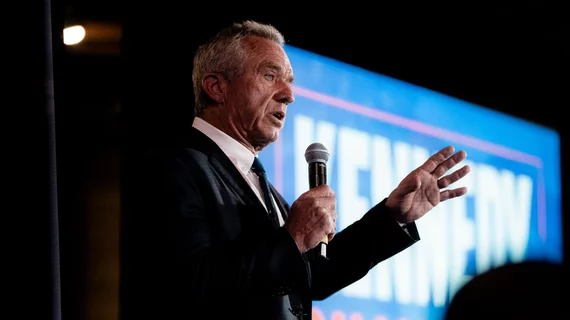Radiology groups ‘look forward’ to working with new HHS Secretary RFK Jr.
Radiology societies said they “look forward” to working with new Health and Human Services Secretary Robert F. Kennedy Jr. following his confirmation by the U.S. Senate Thursday.
Lawmakers voted 52-48 to appoint the vaccine skeptic and former environmental lawyer as President Donald Trump’s principal advisor on health matters. Hundreds of radiologists were part of a group gathering signatures to try and halt his nomination last month amid concerns about his previous promotion of conspiracy theories.
However, the Republican Senate majority moved forward with his nomination, hopeful RFK can serve as an antidote to some of the challenges facing the U.S. healthcare system.
“Today marks a great day for America, particularly for our nation’s children,” Sen. Roger “Doc” Marshall, MD, R-Kan., a trained obstetrician, said in a statement Feb. 13. “With 60% of Americans currently battling chronic diseases, we desperately need a radical shift toward prevention rather than focusing on treatment alone,” he added later.
Radiology advocacy groups on Thursday said they’re ready to work with Kennedy on issues pertinent to the specialty. HHS oversees agencies critical to radiologists including the Food and Drug Administration, Centers for Medicare & Medicaid Services and National Institutes of Health.
“We look forward to an ongoing dialogue with the new secretary of the Department of Health and Human Services and his staff to try to improve healthcare quality, safety, efficiency, and access,” Cynthia Moran, the American College of Radiology’s executive VP of government relations, economics and health policy, told Radiology Business Thursday. “As radiology touches virtually every other part of medicine, it is vital that the ACR continue to work with decision-makers, allied medical societies, patient groups and other stakeholders to move medicine forward.”
"With Secretary Kennedy confirmed, there is significant work ahead to ensure patient access to imaging, address reimbursement challenges, and support radiology practices nationwide,” Linda Wilgus, MBA, co-executive director of the Radiology Business Management Association, said in a separate statement. “The RBMA looks forward to engaging with the administration to navigate these pressing issues.”
Kennedy replaces former California Attorney General Xavier Becerra, who held the HHS secretary role since March 2021. During confirmation hearings, Kennedy denied that he is a vaccine skeptic, though previous statements refute those claims, CNN reported. During a 2019 trip to Samoa, Kennedy reportedly amplified doubts about the safety of measles shots. After his visit, vaccination rates fell from 60% to 31%, “sparking a measles outbreak that killed 83 people—most of them under the age of 5,” opponents said last month. Sen. Mitch McConnell, R-Ky., a survivor of childhood polio, joined Democrats in voting against the nomination.
"RFK Jr.’s dangerous track record is clear—he has sowed doubt in public health, spewed medical misinformation, and peddled conspiracy theories. And it is deeply disturbing to see senators who previously cared about vaccines and critical health efforts, seemingly cave to political pressure to confirm him,” Rob Davidson, MD, an emergency physician and executive director of the Committee to Protect Health Care, which gathered signatures from 350 radiologists opposing the nomination. “This vote is disappointing to the more than 22,000 physicians across the country who joined the [CPHC] in speaking out against RFK Jr.’s nomination out of grave concern for their patients and public health.”
However, proponents expressed optimism that Kennedy will improve regulation of ultra-processed foods, reform the NIH and take on chronic disease. Senators said they believed RFK when he said during confirmation hearings that he supports vaccines.
“As chair of the [Health, Education, Labor and Pensions] Committee, I look forward to working closely with Secretary Kennedy and the Trump administration to improve the health of all Americans,” Sen. Bill Cassidy, MD, R-La., a gastroenterologist, said in a statement.

